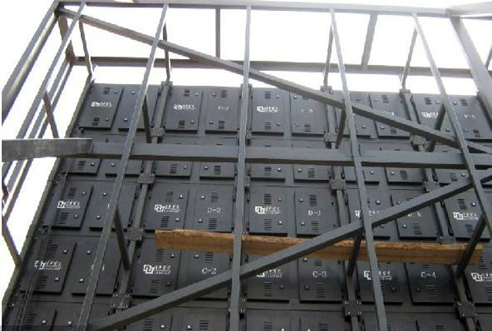Four Steps for the Installation of LED Displays for Outdoor Billboards
Matters Needing Attention for Installation of Outdoor LED Displays
Installation and debugging are essential for using outdoor billboards well. It is necessary for technical construction personnel to master how to build and maintain displays for outdoor billboards, which will promote the effect of advertisements and help information dissemination.

Specifically, there are four steps for installation of LED displays for outdoor billboards: field survey, equipment construction, installation, debugging and operation.
That is to run uniform tests according to the specific environment, terrain, light-emitting range, luminance acceptance ability and other parameters before the installation of outdoor LED displays. To ensure a smooth installation, commanding personnel must carry out a uniform hoisting scheme to make sure that the equipment can be normally and stably used. Different situations should be treated with different measures, which aims to always adopt more appropriate methods.
When installing some outdoor LED billboards, wall-mounted displays, suspended displays and roof displays must be distinguished from each other. During the installation, the crane and the hoister should be used for sectional hoisting according to the distance and height. At the same time, make sure that personnel on the equipment cooperate with each other. Thus, the use and installation of LED billboards at high altitudes can be conducted more properly. During the construction process, safety and accuracy are the top priorities.
Different light emitting ranges require different constructional visual angles for LED displays. Outdoor LED displays should be fixed and installed according to the field acceptance ability and the common visual angle range of people around, so as to ensure that they can see, from a distance at each angle, normal and luminance-balanced images and captions. Only when a wide visual angle is matched with appropriate luminance can the benefits be maximized.
Follow-up inspections cover a lot of matters, such as the LED display waterproof layer, the heat dissipation layer, the LED surface waterproof coating, the rain shielding area above the display, the heat dissipation space at both sides and the power supply line. These basic parts are essential for a fine LED display for graphics and texts. Technical maintenance after the delivery, of course, is also of great importance. We need to carry out uniform management and maintenance for these parts and to replace them in time if they rust, become unstable or be damaged to ensure safe use.
Since outdoor LED displays are used outdoor, they must be treated differently from indoor LED displays. The installation requirements of outdoor LED displays are also different from those of indoor ones. It must be done perfectly at the tiniest level. Otherwise, it is likely to cause trouble. Matters needing attention are listed as follows:
Keep the main body and the shell of displays well-grounded, with the grounding resistance less than 3 ohms, which can discharge in time large current caused by lightning; Displays may be attacked by strong electricity and magnetism caused by lightning.
Displays and the joint between them and buildings must be waterproof and leakproof; Displays should be designed to have good drainage, which can discharge gathered water. It is rather important to make displays waterproof and dampproof. Outdoor displays are under harsh working environments. They are often exposed to the sun, rain, wind and dust. If the equipment gets wet or seriously damp, it will have a short circuit or even catch fire, which may lead to a breakdown or fire hazard. Thus, causing great losses;
Use industrial-grade integrated circuit chips with working temperatures between -40℃ and 80℃, aiming to prevent displays from being unable to start due to low temperatures in winter.
Install an axial flow fan above the back of the display to discharge heat; The working of LED displays will generate a certain amount of heat. If the ambient temperature is too high and the cooling is not effective, the integrated circuit may not work normally or even be burnt down, thus making the display unable to work.
To ensure the visibility from long distances under strong ambient light, ultra-bright LED must be used. To increase the contrast ratio, widen the watching range of the audience, lengthen the visual distance and broaden the visual field; The ambient light sometimes changes a lot. Displays may be exposed to direct sunlight.
The encapsulated displaying medium with a wide visual angle, pure color, well consistency and service life of more than 100,000 hours is currently the most popular equipment, with a square barrel with a shielding edge, silica gel sealing and non-metallic assembly. It is delicate and beautiful in appearance, firm and durable and can prevent direct sunlight, dust, water, high temperature and short circuit. We hereby sincerely warn you that matters needing attention during the installation of outdoor LED displays are related to future use and safety. It is never late for you to take it seriously. The above six points must be done well while installing outdoor LED displays.